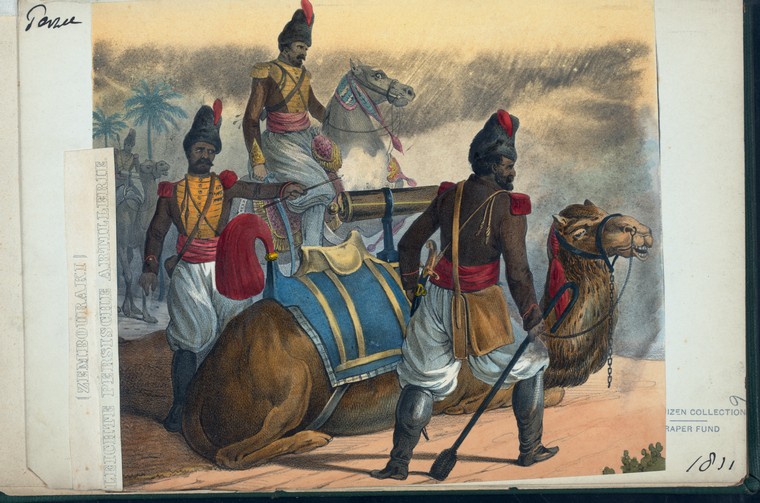

Physiologist Jared Diamond’s 1997 Guns, Germs, and Steel. The Fates of Human Societies is a rare publishing phenomenon. An ambitious yet accessible study on the development of human civilization, it won a Pulitzer Prize, sold over a million copies, was translated into 36 languages, turned up on college reading lists everywhere, and was eventually made into a 3-part National Geographic TV series.
What impressed many reviewers was, in the words of the National Geographic narrator, Diamond’s “highly original theory that what separates the winners from the losers is the land itself – geography. It was the shape of the continents, their crops and animals that allowed some cultures to flourish while others were left behind.” Yet, as illustrated by the fact he buried his discussion of prior writings on this idea in the book’s endnotes, Diamond was well aware that geographical or environmental determinism had a long and often appalling history of justifying social or racial superiority and colonial enterprises. Not surprisingly, he has ever since been at pains to defend his very different take on the subject.
In a nutshell, proponents of environmental determinism maintain that people and cultures are the way they are because they have been shaped by their physical environment. Needless to say, some environments and climates are more conducive to success than others. Aristotle famously commented in his Politics that “those who live in a cold climate and in [northern] Europe are full of spirit, but wanting in intelligence and skill; and therefore they keep their freedom, but have no political organization, and are incapable of ruling over others.” In the more torrid parts of the Middle East, the “natives of Asia” proved “intelligent and inventive, but they are wanting in spirit, and therefore they are always in a state of subjection and slavery.” Luckily, the “Hellenic race, which is situated between them, is likewise intermediate in character, being high-spirited and also intelligent. Hence it continues free, and is the best-governed of any nation, and, if it could be formed into one state, would be able to rule the world.”
Other environmental determinists put more weight on the benefits of adverse conditions. Montesquieu observed in his The Spirit of Laws that the “barrenness of the earth renders men industrious, sober, inured to hardship, courageous, and fit for war: they are obliged to procure by labour what the earth refuses to bestow spontaneously.” By contrast, the “fertility of a country gives ease, effeminacy, and a certain fondness for the preservation of life.” A few decades later John Stuart Mill argued along similar lines that “neither now nor in former ages have the nations possessing the best climate and soil, been either the richest or the most powerful; but (in so far as regards the mass of the people) generally among the poorest, though, in the midst of poverty, probably on the whole the most enjoying.” Part of the problem, Mills argued, was that “[h]uman life in those countries can be supported on so little, that the poor seldom suffer from anxiety, and in climates in which mere existence is a pleasure, the luxury which they prefer is that of repose.”
The fact that technological achievements in a particular location are profoundly affected by the local physical geography is obviously indisputable. After all, one does not fault the past inhabitants of Switzerland or the Tibetan plateau for having contributed little to maritime technology, nor past Inuit people for failing to develop agriculture.
Yet, the evidence pointing to the profound impact of geography and climate on political institutions and human achievements has always been extremely thin. As critics have long observed, the dominant culture at different points in time (e.g., Mediterranean or northern European) is always said to be the beneficiary of the best physical geography. The key problem, however, is that a constant factor is used to explain very variable outcomes over time.

One of the best short essays against environmental determinism is Voltaire’s entry on the “climate” in his Philosophical Dictionary. One of his targets was his contemporary Jean Chardin, according to whom in Persia the climate was so warm that it “enervates the mind as well as the body, and dissipates that fire which the imagination requires for invention.” “In such climates,” Chardin wrote, “men are incapable of the long studies and intense application which are necessary to the production of first-rate works in the liberal and mechanic arts.” And yet, Voltaire commented, “Chardin did not consider that Sadi and Lokman were Persians,” nor did he “recollect that Archimedes belonged to Sicily, where the heat is greater than in three-fourths of Persia.” He also forgot that “Pythagoras formerly taught geometry to the Brahmins.”
Another problem for the likes of Chardin and Montesquieu, Voltaire wrote, was that “[e]verything changes, both in bodies and minds, by time” when the “climate has not at all changed.” One need only look at the changing political fortunes and intellectual achievements in Egypt, Greece, Rome and England to see the truth of this statement. Indeed, in his Misopogon, the Roman Emperor Julian commented nearly a millennia and half earlier that what “pleased him in the Parisians was the gravity of their characters and the severity of their manners.” Observing his contemporaries, Voltaire couldn’t refrain from observing that “these Parisians, without the slightest change of climate, are now like playful children, at whom the government punishes and smiles at the same moment, and who themselves, the moment after, also smile and sing lampoons upon their masters.” Climate, Voltaire wrote, “has some influence, government a hundred times more; religion and government combined more still.”
In the end though, perhaps the most pithy jibe against environmental determinism is the fact that, in the words of development economist Peter Bauer, the “weather tends to be bad in centrally controlled economies.” Climate activists who are steering us in this political direction in the name of “building back better” should ponder these words.
Pierre Desrochers, is Associate Professor of Geography, University of Toronto Mississauga.

READER COMMENTS
David Henderson
Dec 13 2021 at 1:01pm
Great post!
My favorite sentence: “The key problem, however, is that a constant factor is used to explain very variable outcomes over time.” To explain a change, you typically need to point to a factor that changed.
Also I liked this:
In the end though, perhaps the most pithy jibe against environmental determinism is the fact that, in the words of development economist Peter Bauer, the “weather tends to be bad in centrally controlled economies.”
The Bauer line reminded me of something one of my students told me when I was teaching economics in Prague in October 1999. He was the oldest student in the class and somewhat older than me and so he had experience with Communism as an adult. After I had laid out the essence of Hayek’s “The Use of Knowledge in Society” and used it to explain why socialism hadn’t worked, he came up during a break and said, with a straight face that would have made the best comedian envious:
“Professor, there are 4 problems with Communism: Winter, Spring, Summer, and Fall.”
nobody.really
Dec 15 2021 at 12:20am
I’d heard it said that college education has only two problems. One is its form. The other is its content.
nobody.really
Dec 15 2021 at 12:10am
Intriguing arguments.
Yet I am also intrigued by James Suzman’s Work: A Deep History, from the Stone Age to the Age of Robots, and by the “Big History” movement. Suzman observed that in hunter/gatherer societies, people tended to work about 13 hr/wk, and enjoyed enormous leisure. Moreover, they did not seem to be especially prone to starvation or disease. (One lesson of Guns, Germs, Steel was that raising livestock is a primary source of contagious disease–including sexually transmitted disease. Societies that don’t raise livestock are less prone to disease.) Because hunter/gatherers were nomadic, they developed very limited material possessions (including children)–and indeed developed a culture of compulsory egalitarianism. And, rejecting the central premise of economics, hunter/gatherers tend to believe that they live in world of plenty, so there is little point in working extra hard to amass wealth, or in delaying consumption. Under such circumstances, there is relatively little reason for war, and therefore little reason for the social hierarchies necessary to raise armies. But, of course, these hunter/gatherer societies can only live in environments where there is an adequate food supply year ’round.
In contrast, societies that cultivate crops that can be stored can amass wealth–and in climates where food ceases to be abundant for long periods, it is necessary that they do so. But in these circumstances, it becomes lucrative to plunder stores of wealth–and therefore necessary to protect them. These are contexts in which greater inequality becomes possible, and greater social hierarchies become necessary. (Some societies developed agriculture around root crops–crops that could be harvested at any time, but the produce could not be long stored after harvest. These societies did not develop the same social hierarchies as grain-based agricultural societies.)
With this background, I would not be surprised to find that people who live in environments that support a hunter/gatherer lifestyles would have less social hierarchy and material culture, and this would look rather privative to people who live in grain-based agricultural societies.
Pierre Desrochers
Dec 15 2021 at 9:21am
I haven’t read Suzman, but my understanding is that he’s essentially restating arguments made earlier by the likes of Richard Lee, Marshall Sahlins, John Gowdy and (if I read your comment on grain-based societies correctly) James C. Scott.
A few problems with this line of thought is that hunter-gatherers typically had very low birthrates, high death rates (e.g., 40% children died before 15; they suffered from ‘traveler’s diarrhea,’ i.e., in mobile groups little opportunity to develop resistance to local pathogens, etc.), engaged in infanticide and senilicide, had very high homicide rate and short life expectancy (20<x<29). They were also afflicted by zoonosis (i.e., infections transmitted to humans by wild animals or their parasites).
More specifically though, the problem with the notion that they spent very little time working is that it is untenable. More recent estimates is that they worked comparable amounts of hours to settled populations if you factor in labor-intensive food processing (e.g., cracking nuts, cleaning roots, skinning/butchering game), tool making, food/fuel gathering, cooking, child rearing and migration (time).
As far as inequality, it existed as a result of unequal hunting skills, women/number of partners and the division of labor. I also suspect h-g tribes fought over the best territories and migratory routes.
And all hunting-gathering diets were also deficient in some ways, be it their greater “feast or famine” character (as opposed to more reliable food intake from farming) and the fact that they weren’t much more varied than early farmers who did not give up on foraging. And I don’t know if Suzman went there, but the physiological evidence on h-g being taller and healthier than early farmers is much more ambiguous than Diamond suggests.
In the end though, it is probably the case that h-g populations were stable not because they lived in harmony with nature, but because of problems such as meagerness of resources and low fat intakes that might have resulted in low birth rate and spontaneous abortions, among others.
If you want a few references on these topics, you can do worse than look up the freely accessible content of one of my undergraduate courses (lectures 4-5) https://geog.utm.utoronto.ca/desrochers/ggr-329h5f-environment-and-the-roots-of-globalization/
Phil H
Dec 15 2021 at 4:50am
Aristotle was wrong about climate; Voltaire saw through poor logic; therefore Joe Biden’s a communist.
A true MAGA syllogism. If anyone can see an actual trail of logic in this writing, I’d honestly be interested to hear it.
Comments are closed.